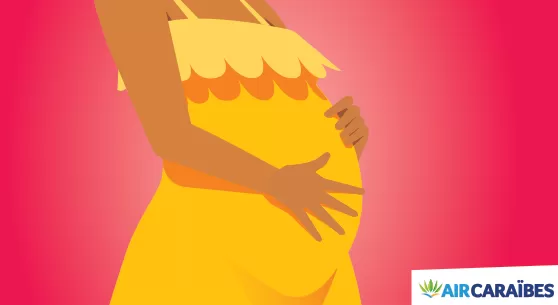Passengers with special request


Personalized assistance for passengers with special conditions
A person with reduced mobility is defined as a person whose mobility is reduced by a physical disability (sensory or motor), by a mental impairment, by age, illness or any other disability when using a means of transport, and when his or her situation requires special attention and the adaptation to that person's specific needs of the service provided to all passengers.
Five categories of passengers are subject to this attention
- Motor disabilities
- Respiratory disabilities (requiring oxygen)
- People with mental disorders (requiring a treatment delay of more than 8 days)
- Visually impaired and hearing impaired
- Special cases (pregnant women, medical repatriates, heavily-built passengers)
NB: These passengers must identify themselves at the time of booking
ATTENTION: If the traveler requires assistance and in order to best prepare their trip, they must present themselves at check-in following these indications:
Travel on our transatlantic network: Presentation no later than 2 hours before flight departure.
Travel on our regional network:
- Short-haul (between Pointe-à-Pitre / Fort-de-France / Saint-Martin / Sainte-Lucie): check-in 1 hour before flight departure.
- Medium-haul (between Pointe-à-Pitre / Fort-de-France / Saint-Domingue / Port-au-Prince): check-in 2 hours before flight departure.
CONDITIONS ON CARRIAGE FOR PREGNANT WOMEN ON OUR LINES
- Medical clearance is not required to fly under 6 months (28 weeks) of pregnancy
- We recommend that you bring a medical certificate between 6 months (28 weeks) and 8 months (36 weeks) of pregnancy. The purpose of the certificate is to indicate your due date and that your pregnancy presents no complications.
- After 8 months (36 weeks), transportation is no longer authorized
SOME TIPS FOR TRAVEL
To ensure that your trip goes smoothly, we recommend that you:
- Choose loose, comfortable clothing
- Wear compression tights to aid blood circulation
- Move around frequently (reserving an aisle seat will make it easier to get up)
- Drink regularly, but avoid fizzy drinks
- Avoid heavy meals
- Fasten the seat belt below the abdomen, in the pelvic area.
CONDITIONS OF TRANSPORT FOR HEAVY-BODY PASSENGERS ON OUR LINES
As a guide, here's some information on the width of our seats between the two armrests:
- Soleil Class (Economy): a 42 cm wide seat
- Caraïbes Class (Premium Economy): a 45 cm wide seat
- Madras Class (Business): a 48 cm wide seat
RESERVATION OF A SECOND SEAT
For greater comfort and safety, and if the passenger's waist circumference exceeds half these dimensions, Air Caraïbes recommends reserving a second seat in advance with Air Caraïbes agencies, our reservations center at
or from a travel agency.
We invite you to consult the list of our points of sale here.
NB: Please note that if your flight is full and you have not reserved a second seat, you may be denied boarding for safety reasons if your build does not allow you to sit on a single seat.
INCAD - INCAPACITED PASSENGER HANDLING ADVICE
IATA (International Air Transport Association) has defined a standard medical certificate for the transport of disabled passengers: the INCAD (Incapacited passenger handling advice), provided by the carrier. This certificate is mandatory for WCHC service requests (it is not for WCHS and WCHR).
The INCAD 1 must be completed by the sales agent and the passenger.
INCAD 2 is to be completed by the patient's attending physician, intended for the company doctor and the Air Caraïbes special cases department who, depending on the declarations, authorize or not the trip.
If the passenger wishes to use a wheelchair (WCHC type), the request must be made in the booking file more than 48 hours before departure. We invite you to contact the reservations center at
to make your request for assistance.
IT IS OBLIGATORY TO NOTIFY THE COMPANY WHEN THE PASSENGER:
- Suffers from a contagious and transmissible disease
- Presents illnesses or disabilities that may result in unusual behavior
- Presents a physical condition resulting in inconveniences for the well-being-well-being or comfort of passengers and crew
- May represent a potential risk to flight safety or result in a diversion
- May require medical supervision or special equipment to maintain good health during the flight
Accompanying persons include:
- Doctor,
- Nurse,
- "Travel companion".
In the special case of a blind, deaf or motor-impaired person, the "travel companion" may be an assistance dog.
The company reserves the right to refuse an ESAN (Emotional Support Animal).
MANDATORY PRESENCE OF AN ASSISTANT
The presence of a personal care assistant/safety assistant is mandatory in the following cases to help people with disabilities in the event of an emergency:
- Passenger with an intellectual disability unable to understand and apply safety instructions.
- Blind and deaf passenger
- Passenger with a physical disability unable to participate in their own evacuation without assistance, such as quadriplegics.
Paraplegics, paralytics and people without arms may travel unaccompanied.
If the person with a disability is traveling with a personal care attendant and/or safety assistant, they must occupy seats immediately adjacent to or in front of the passenger they are assisting. This attendant must be at least 18 years of age.
When a personal care attendant/safety assistant is not required, assistance will be provided by cabin crew, to fasten or unfasten the seatbelt and to pull and adjust the oxygen mask, if necessary. However, this does not include:
- Assistance with eating and taking medication
- Assistance with physiological needs
- Any other assistance or personal care
The ability to perform the actions listed above will be assessed.
We offer 3 categories of wheelchair assistance:
- WCHR or "Weelchair Ramp": from check-in to the boarding lounge passenger in wheelchair. (passenger can walk alone),
- WCHS or "Weelchair Steps": from check-in to the aircraft door (passenger can walk alone but has difficulty on stairs),
- WCHC or "Weelchair Cabin seat": from check-in to the aircraft seat (passenger is unable to move alone).
The patient must be in possession of a certificate of fitness for air travel issued by the company doctor. The presence of a medical attendant and an agreement from the company doctor are mandatory in the case of onboard treatment.